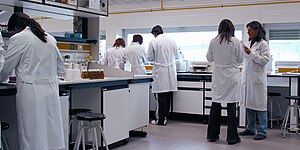Scientists

Chemical scientists in a laboratory of the University of La Rioja in Spain
|
|
| Occupation | |
|---|---|
| Names | Scientist |
|
Occupation type
|
Profession |
|
Activity sectors
|
Use of scientific method |
| Description | |
| Competencies | Science (Astronomy, Biology, Botany, Computer science, Chemistry, Cosmology, Geography, Geology, Jurisprudence, Mathematics, Paleontology, Physics, Economics and others) |
A scientist is a person engaging in a systematic activity to acquire knowledge that describes and predicts the natural world. In a more restricted sense, a scientist may refer to an individual who uses the scientific method. The person may be an expert in one or more areas of science. The term scientist was coined by the theologian, philosopher and historian of science William Whewell. This article focuses on the more restricted use of the word. Scientists perform research toward a more comprehensive understanding of nature, including physical, mathematical and social realms.
Philosophy is today typically regarded as a distinct activity from science, though the activities were not always distinguished in this fashion, with science considered a "branch" of philosophy rather than opposed to it, prior to modernity. Philosophers aim to provide a comprehensive understanding of fundamental aspects of reality and experience, often pursuing inquiries with conceptual, rather than empirical, methods. Natural scientific research is usually also distinguished from inquiry in the Humanities more generally, and often with inquiry in the Social Sciences and Mathematics on various grounds, although these distinctions may be controversial.
Scientists are also distinct from engineers, those who design, build, and maintain devices for particular situations; however, no engineer attains that title without significant study of science and the scientific method. When science is done with a goal toward practical utility, it is called applied science. An applied scientist may not be designing something in particular, but rather is conducting research with the aim of developing new technologies and practical methods. When science seeks to answer questions about fundamental aspects of reality it is sometimes called natural philosophy, as it was generally known before the 19th century.
Science and technology have continually modified human existence through the engineering process. As a profession the scientist of today is widely recognized. Scientists include theoreticians who mainly develop new models to explain existing data and predict new results, and experimentalists who mainly test models by making measurements — though in practice the division between these activities is not clear-cut, and many scientists perform both tasks.
...
Wikipedia
